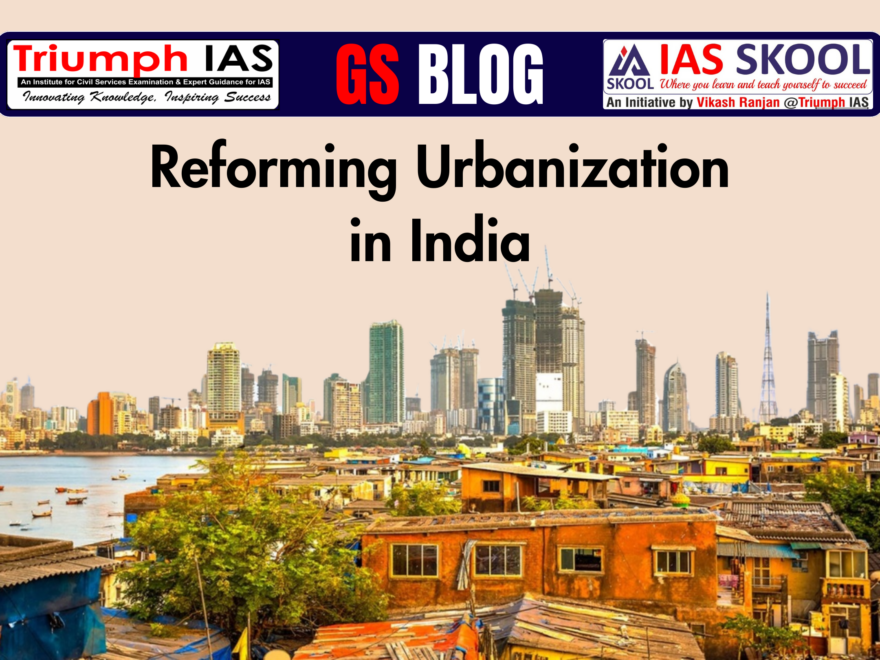Reforming Urbanization in India
India’s urban population is projected to double to 800 million within the next three decades, requiring an estimated ₹70 lakh crore in infrastructure investment by 2036. However, challenges such as inadequate government funding, stagnant municipal revenues, and a decline in public-private partnerships are slowing progress. To address these issues, structural reforms, well-defined project pipelines, the integration of digital infrastructure, and collaborative governance are essential. Implementing strategic interventions in the coming decade will be crucial to reshaping India’s urban landscape into a sustainable and inclusive ecosystem.
Regulatory Frameworks Governing India’s Urban Development
India’s urban governance is shaped by a range of constitutional provisions, policies, and legal frameworks aimed at ensuring sustainable urban development and addressing the unique challenges of urbanization.
Constitutional Framework
74th Constitutional Amendment Act (1992):
- Lays the foundation for urban governance by empowering Urban Local Bodies (ULBs), including municipalities and municipal corporations.
- Entrusts ULBs with functions like urban planning, water supply, sanitation, public health, and local infrastructure development..
Urban Planning and Development Authorities
- Urban planning responsibilities are shared by Urban Development Authorities (e.g., Delhi Development Authority) and state town planning departments.
- These agencies draft Master Plans and Development Plans to regulate land use, infrastructure, and zoning.
Environmental Regulations
Urban environmental governance is governed by several key legislations:
- Environment Protection Act, 1986: Establishes environmental standards and regulates urban industrial pollution.
- Solid Waste Management Rules, 2016: Mandates waste segregation, recycling, and scientific disposal.
- Air Act, 1981 & Water Act, 1974: Focus on maintaining air and water quality in urban areas.
Land and Housing Regulation
- Land use, development, and housing projects are governed by state-specific Land 0R evenue Acts, the Urban Land (Ceiling and Regulation) Act, and local zoning laws.
- The Real Estate (Regulation and Development) Act, 2016 (RERA):
- Introduced transparency and accountability in real estate, ensuring the timely completion of projects and safeguarding consumer interests.
India’s regulatory framework provides a structured approach to urban governance, balancing infrastructure development with environmental sustainability and citizen welfare. However, challenges remain in implementation and coordination, highlighting the need for integrated and adaptive governance mechanisms

Key Challenges Impacting the Development of India’s Urban Landscape
India’s urbanization is accelerating rapidly, but its urban centers face critical challenges that hinder sustainable growth and development. Below are the pressing issues impacting the urban landscape:
Urban Infrastructure Deficit
- Indian cities are struggling with outdated and inadequate infrastructure, unable to keep up with rapid population growth and urbanization.
- A report by the Ministry of Statistics and Programme Implementation (December 2023) highlights that 431 infrastructure projects, each exceeding ₹150 crore in investment, suffered a cumulative cost overrun of ₹4.82 lakh crore.
- Overburdened roads, bridges, and transport systems frequently fail, causing disruptions and fatalities, such as the canopy collapse at Delhi Airport in July 2024, which underscored the urgent need for resilient infrastructure.
Air Pollution
- Urban areas in India face severe air quality issues due to vehicular emissions, industrial activities, construction dust, and stubble burning.
- Thirty-nine of the world’s 100 most polluted cities are in India, with Delhi frequently recording hazardous Air Quality Index (AQI) levels.
- In November 2024, Delhi’s pollution levels led to the closure of schools, showcasing the dire public health impact.
- Programs like the National Clean Air Programme (NCAP) have potential but require stringent enforcement for meaningful improvement.
Water Scarcity and Management Issues
- Urban centers face acute water crises due to over-extraction, pollution, and poor water management systems.
- Bengaluru’s 2024 water shortage and Chennai’s 2019 “Day Zero” scenario remain stark reminders of looming urban water challenges.
- Significant water losses during distribution and inadequate rainwater harvesting practices exacerbate the problem.
Housing Shortages and Slum Proliferation
- High rural-to-urban migration has widened the housing gap, forcing many into informal settlements or slums lacking basic amenities like sanitation, clean water, and electricity.
- Over one-third of India’s slum population resides in 46 million-plus cities, with Mumbai alone reporting that 41.3% of its population lives in slums.
Traffic Congestion and Public Transport Deficiencies
- Increasing private vehicle ownership and insufficient public transportation systems have made traffic congestion a major urban challenge.
- Cities like Bengaluru and Pune rank among the world’s top 10 worst traffic-hit cities, with peak travel times stretching over hours.
- Congestion leads to productivity losses, elevated fuel consumption, and heightened emissions.
Waste Management Crisis
- Urban waste management systems are overwhelmed by the 62 million tons of annual waste generation in India, as per The Energy and Resources Institute (TERI).
- Of this, only 43 million tons are collected, with 31 million tons being dumped in landfills like Delhi’s Ghazipur, which emit toxic gases and contaminate water resources.
Economic Disparities and Urban Poverty
- Urban areas experience widening economic inequality, with rising living costs and inadequate job opportunities for low-income groups.
- The informal sector, which employs a significant portion of the urban workforce, often lacks social security and stable wages.
- Inflation, particularly in food prices, has reduced disposable incomes. In 2024, urban unemployment stood at 8.7%, according to CMIE.
Climate Change Vulnerability
- Over 85% of India’s districts are exposed to extreme climate events like floods, droughts, and cyclones.
- Unplanned urban expansion worsens flooding, as seen in the Chennai and Mumbai deluges, by encroaching on natural drainage systems.
- Rising temperatures and urban heat islands disproportionately affect marginalized populations. In the first nine months of 2024, India experienced extreme weather on 93% of the days, resulting in 3,238 deaths and extensive crop damage.
Governance and Policy Implementation Gaps
- Urban governance suffers from fragmented authorities, overlapping jurisdictions, and limited coordination among agencies.
- Municipal bodies often lack financial autonomy, with property tax revenue contributing only 0.12% of GDP.
- Despite ambitious programs like the Smart Cities Mission, progress has been slow due to bureaucratic inefficiencies and inadequate capacity.
Urban Sprawl and Loss of Green Cover
- Unregulated urban expansion has led to encroachment on forests, wetlands, and agricultural lands, reducing green cover and biodiversity.
- Bengaluru’s urbanized area expanded by 1,055% since 1973, resulting in an 88% loss of vegetation. This unchecked growth contributes to increased carbon emissions and intensifies climate impacts.
Urban Crime and Safety Concerns
- Rising urban crime rates, including theft, cybercrime, and gender-based violence, undermine safety in cities.
- Weak policing, inadequate urban design, and poor legal enforcement exacerbate the issue.
- According to the 2023 NCRB report, Delhi accounted for 29.04% of crimes against women among 19 major cities.
Cultural Dilution and Loss of Urban Identity
- Rapid urbanization often results in the loss of cultural heritage, traditional architecture, and local identity.
- Gentrification displaces indigenous communities, while generic urban designs fail to reflect regional ethos.
- Cities like Varanasi and Jaipur face challenges in balancing modernization with heritage preservation. For example, Rajasthan’s folk arts like Kalbelia and Ghoomar are fading as practitioners migrate to urban centers.
- Addressing these challenges requires a multi-pronged approach, combining robust governance, sustainable planning, and effective implementation to transform India’s urban centers into inclusive, livable, and resilient spaces.
Measures to Enhance India’s Urban Landscape
India’s urban development requires a holistic approach to address challenges and create sustainable, inclusive, and resilient cities. Below are key strategies to enhance the urban landscape:
- Strengthening Urban Governance and Decentralization
- Empower urban local bodies (ULBs) with financial autonomy and capacity-building initiatives to effectively implement urban development plans.
- Fully implement the 74th Constitutional Amendment to delegate more powers to ULBs.
- Leverage funding provided under the 15th Finance Commission to enhance the financial capabilities of municipal bodies.
- Modernizing Urban Infrastructure
- Conduct comprehensive audits and upgrades to ensure infrastructure safety and efficiency.
- Attract investments through Public-Private Partnerships (PPPs) in sectors like transport, utilities, and housing. Successful examples include the Delhi-Mumbai Industrial Corridor (DMIC).
- Promote smart city infrastructure, such as automated traffic management systems, to optimize urban services.
- Utilize the Urban Infrastructure Development Fund (UIDF) introduced in the 2023-24 Budget for city-level improvements.
- Promoting Affordable Housing and Slum Rehabilitation
- Expand affordable housing initiatives like the Pradhan Mantri Awas Yojana (PMAY) by involving private developers.
- Introduce inclusive zoning policies and incentives for building affordable housing units.
- Implement in-situ redevelopment models for slum rehabilitation, minimizing displacement, as seen in Mumbai’s Dharavi project.
- Investing in Sustainable Urban Mobility
- Expand metro systems, suburban railways, and public bus networks to reduce reliance on private vehicles.
- Integrate last-mile connectivity with electric vehicles (EVs) and bicycle-sharing programs to improve accessibility.
- Smart traffic management systems and congestion charges can alleviate traffic bottlenecks. Examples include Bengaluru’s metro expansion and Delhi’s electric bus fleet.
- Advancing Solid and E-Waste Management
- Implement decentralized waste segregation systems at the ward level to enhance recycling and reduce landfill dependency.
- Adopt advanced technologies like waste-to-energy plants and material recovery facilities to manage growing waste volumes.
- Enforce Extended Producer Responsibility (EPR) laws to ensure companies recycle discarded electronics. Bengaluru’s success in decentralized composting offers a replicable model.
- Climate-Resilient Urban Planning
- Incorporate climate adaptation strategies into urban planning to address risks like floods, heatwaves, and rising sea levels.
- Restore natural drainage systems and wetlands, as demonstrated in Chennai’s flood mitigation efforts.
- Combat urban heat islands with green roofs, vertical gardens, and urban forests while improving air quality.
- Incentivize rooftop solar installations and renewable energy adoption.
- Ensuring Urban Water Security
- Adopt comprehensive water management policies focusing on rainwater harvesting, wastewater recycling, and aquifer recharge.
- Scale successful initiatives like Chennai’s rainwater harvesting mandate nationwide.
- Install smart water meters and IoT-based monitoring systems to reduce wastage and enhance efficiency.
- Promote decentralized wastewater treatment systems (DEWATS) for effective reuse.
- Promoting Digital Inclusion
- Bridge the digital divide in urban slums by expanding internet access through initiatives like BharatNet.
- Launch digital literacy programs for low-income groups to improve access to e-governance, telemedicine, and online education.
- Develop smart city solutions, such as integrated command centers, to streamline urban operations.
- Revitalizing Cultural and Heritage Assets
- Prioritize the conservation of historical landmarks and cultural sites during urban development.
- Promote adaptive reuse of heritage structures, such as converting Rajasthan’s palaces into hotels, to combine preservation with economic utility.
- Mandate the integration of traditional architecture and cultural elements in urban planning.
- Follow UNESCO guidelines for effective heritage management.
- Encouraging Participatory Urban Planning
- Foster citizen engagement in urban governance to improve transparency and accountability.
- Scale digital grievance redressal platforms like MyGov to address urban-specific concerns.
- Implement participatory budgeting, allowing citizens to influence local development priorities. Pune’s success demonstrates the benefits of this approach.
- Mainstreaming Renewable Energy in Cities
- Transition to cleaner energy sources by promoting rooftop solar installations, wind energy projects, and smart grids with energy storage systems.
- Incentivize energy-efficient buildings through tax rebates and other benefits.
- Examples like Cochin’s fully solar-powered airport illustrate the feasibility of large-scale renewable energy adoption.
- Strengthening Urban Disaster Preparedness
- Establish dedicated urban disaster response units equipped to handle risks like floods, earthquakes, and industrial accidents.
- Develop early warning systems with real-time data from IoT sensors to minimize disaster impacts.
- Draw lessons from Mumbai’s flood response to create robust urban disaster management frameworks.
These measures, if implemented effectively, can transform India’s urban landscape into a sustainable, inclusive, and resilient ecosystem that meets the needs of its rapidly growing population.
The End of the Blog: Reforming Urbanization in India

|


















